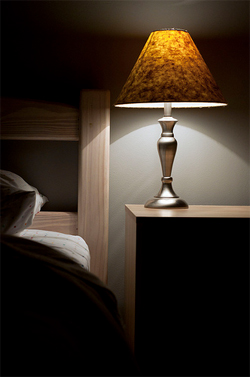A bedroom appliance that can whip up instant orgasms at half the price of a decent food processor doesn’t just sell itself, so naturally Church & Dwight, the company that manufacturers Trojan-brand vibrators — has created a commercial to hype its latest innovation, the Tri-Phoria Personal Massager. Last year, when Church & Dwight wanted to spread the word about a similar item, the Trojan Vibrating Mini Personal Massager, it met with limited success. According to the New York Times, some TV networks agreed to air the ad, but only between the hours of midnight and 5 a.m., when the audience pretty much consists of depressed insomniac beagles whose owners keep the TV on all night to mitigate their howling. This time around, network executives have been more accommodating. Comedy Central, Spike, and VH1 have all aired Church & Dwight’s latest ad in the past few weeks, at primetime, during the dinner hour, and sometimes even while the sun was still high overhead, shining brightly on America.
To achieve such widespread exposure, the new ad is nearly as chaste as an unwed Jonas brother. There’s some verbal heavy petting, with mentions of “powerful sensations,” “screams of ecstasy,” and “intense waves of pleasure,” but the perky unseen narrator never quite goes all the way and utters the taboo word “vibrator.” The product itself remains as covered up as a mummy in a burqa. Interspersed with numerous shots of its discreet purple packaging, we see images of a pretty blond woman. First, she’s stressed-out and stuck in traffic. Then, she’s standing against a heavenly backdrop of blue sky and fluffy clouds and caressing her neck as a strong, sensitive breeze tussles her golden tresses. Then she’s dressed completely in white, riding a horse on the beach and radiating the sort of beaming, beatific joi de vivre rarely seen outside tampon commercials. Then she’s at one of those vaguely restaurant-like restaurants where ethnically diverse gaggles of beautiful women give vibrators to each other before the cheese poppers arrive.
You know that Clairol Herbal Essences commercial from the ’90s where the thick-maned hottie gets gang-shampooed in a public library by a wolf-pack of gay hairdressers and then ejaculates great foamy dollops of linoleamidopropyl PG-dimonium chloride phosphate and polyethylene glycol 1000 monocetyl ether on the other library patrons? The Trojan vibrator ad is not nearly as sexy. You know that recent commercial for Fling candy bars, which appears to depict two strangers going at it in a retail dressing room? The Trojan vibrator ad is not nearly as sexy. You know that commercial where Jamie Lee Curtis touts the great-tasting yogurt laxative she uses to overcome her bouts with irregularity? The Trojan vibrator is a little sexier than that one, but not much.
“No matter how liberal you are, a little kid doesn’t need to hear the word ‘vibrator,’” MTV executive vice president of advertising Brian Fays told the New York Times, but apparently the rest of nation is a lot more liberal than the average MTV advertising executive now. Vibrators are sold at Walmart, Target, CVS, 7-Eleven, Spencer’s Gifts, American Apparel, and even in the mail-order bible of the fuddy-duddy set, the Vermont Country Store catalog. In the Next Room, playwright Sarah Ruhl’s Victorian-era saga about the invention of the vibrator, was a 2010 Pulitzer-Prize finalist and also a Tony-Award nominee. Maggie Gyllenhaal will be probing similar territory in the upcoming movie Hysteria. “Me and my vibrator are very happy,” Lady Gaga announces to the world. Taylor Momsen says her “best friend is her vibrator.” About the only place you can’t see vibrators these days, in fact, is in vibrator commercials.
Between 1972 and 1976, sex researcher Shere Hite surveyed women and found that fewer than one percent of them used vibrators. In 2008, Church & White commissioned its own survey and found that 53 percent of women have used one. The Internet played a huge role in mainstreaming the device, making it possible to purchase one without venturing into seedy downtown sex shops or enduring the chirpy hard sell of home-based passion parties.
But the boob tube has also played a key role in the vibrator’s cultural ascendancy. In 1998, an early episode of Sex and the City practically functioned as an infomercial for the Rabbit. Dirt, The New Adventures of Old Christine, and Eastwick are just a few of the more recent shows unafraid to say the v-word without shame or self-censure. On Keeping Up with the Kardashians, the vibrator talk sometimes gets so frank it might make an MTV advertising executive faint. “It’s big and black!” Kourtney tells her sister Khloe as the pair hunt for their mom’s secret pleasure tool. “Like a dildo?” Khloe asks. “Do you think she uses it?” “We’ll know by the way it smells,” Kourtney replies.
With such candor informing actual programming, it may seem incongruent that vibrator commercials are so demure. But imagine what would happen if TV executives allowed commercials for vibrators and other sex-related products to be as sexy as commercials for hamburgers. Millions more women would buy vibrators. Millions more men would buy Viagra. The sexual satisfaction of the country would skyrocket, and the sublimated sexual urges we collectively channel into silky smooth chocolate bars and spicy snack chips would plunge. With our appetite for anxious compensatory consumption waning, our flaccid economy would wither even further. Eventually we’d fall into some weird form of poor but ecstatic communism. Only priggish vibrator ads keep us from becoming North Korea. • 8 October 2010




